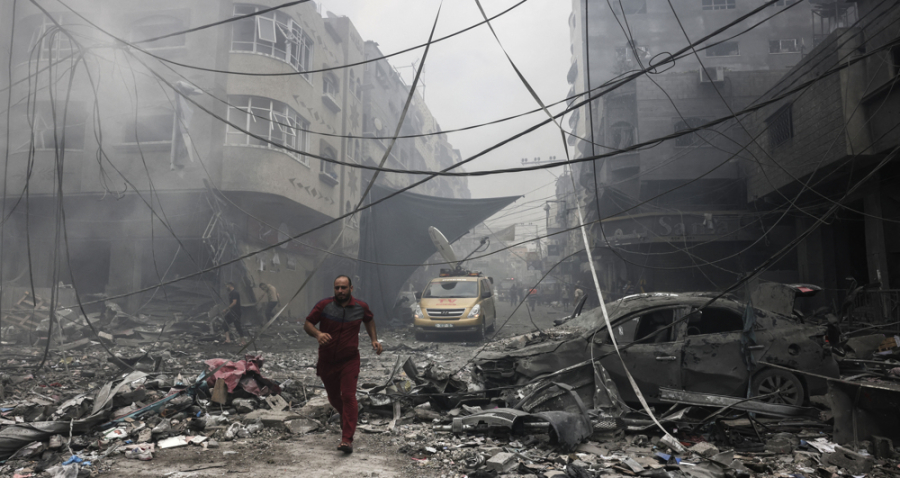The death toll from Israel’s savage attacks on the Gaza Strip continues to rise nearly a week after the regime launched its brutal onslaught on the besieged Palestinian territory.
The Health Ministry in Gaza announced on Friday that at least 1,900 Palestinians, including 614 children, and 370 women have been martyred in seven days of incessant Israeli bombardment of the blockaded territory.
At least 7,696 Palestinians have also been wounded in the bombardment.
70 people, mostly women and children, martyred while fleeing
Meanwhile, officials in Gaza said that 70 people, mostly women and children, were killed in Israeli airstrikes on convoys fleeing Gaza City on Friday.
Hamas’ media office said the cars were struck in three places as they headed south from Gaza City.
The Israeli army ordered residents to evacuate the city early Friday ahead of an expected ground invasion.
Israeli forces killed at least 16 Palestinians across the occupied West Bank as they opened live fire on demonstrators rallying to show solidarity with the people of the Gaza Strip.
People took part in demonstrations in cities across the Israeli-occupied West Bank on Friday, including Ramallah, Tulkarem, Nablus and al-Khalil (Hebron).
The Palestinian health ministry said in the early hours of Saturday that a total of 51 people have been killed since Oct. 7.
The regime’s air raids claimed at least two dozen lives in the densely populated Jabaliya refugee camp in northern Gaza on Thursday.
Hundreds of thousands of Gazans have also been displaced as a result of the regime's relentless and indiscriminate attacks.
At least 423,000 people have now been forced to flee their homes in the Gaza Strip, the United Nations said.
As of late Thursday, the number of displaced people in Gaza had risen by an additional 84,444 people and reached 423,378, the UN humanitarian agency OCHA said.
The coastal territory remains under Israel’s complete siege with no access to electricity, water, food, and medicines.
Israel started its onslaught on Saturday after Gaza-based resistance groups launched a multi-front operation against the regime.
Israel used banned white phosphorus munitions against desperate people in Gaza, a human rights monitor said.
In a post on X on Thursday, Maha Hussaini, director of strategies at the Euro-Mediterranean Human Rights Monitor in Geneva, said that the Tel Aviv regime was “using internationally prohibited white phosphorus in Gaza.”
“These munitions are an indiscriminate incendiary weapon that ignites on contact with oxygen. In closed spaces, the toxic fumes can cause asphyxiation & permanent respiratory damage,” she added.
Meanwhile, Human Rights Watch also said on Thursday Israel used white phosphorus munitions in Gaza and Lebanon.
The United Nations Humanitarian Office (OCHA) said on Thursday that Israeli bombardment of the Gaza Strip has inflicted damage on over 12,600 homes in the coastal territory.
It added that 1,000 of these homes were flattened and another 560 housing units sustained serious damage, which rendered them uninhabitable.
Many people in the impoverished sliver face dire shortages of water, fuel and medical supplies, as all 13 hospitals there are only partially operational due to severe shortages of fuel and crucial medical supplies.
It said that the reduction in water supplies due to Israel's tightening its siege on the strip has resulted in dire water shortages for more than 650,000 people in the territory of 2.3 million.
As sewage systems have been destroyed, fetid wastewater is sent into the streets and posing a health hazard, OCHA added.
Médecins Sans Frontières (MSF), also known as Doctors Without Borders, warned on Wednesday that hospitals across Gaza are overwhelmed and experiencing shortages of drugs, medical supplies and electricity.
In a statement, Avril Benoît, executive director of MSF-USA, said the aid agency was "seeing shortages of water, electricity, and fuel, which hospitals rely on for their generators."
Gaza is under full Israeli siege and now the only power plant there has shut down due to a fuel outage. According to health authorities, overwhelmed hospitals without electricity will have to rely on their emergency generators, which will only last two to four days.
Hassan Khalaf, the medical director of al-Wafa Hospital in Gaza City, said there are currently 100 newborn babies relying on medical equipment currently in Gaza.
source: Press TV


















